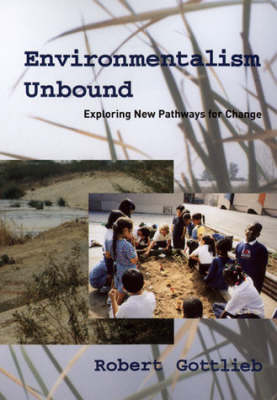Urban and Industrial Environments
4 total works
In Environmentalism Unbound, Robert Gottlieb proposes a new strategy for social and environmental change that involves reframing and linking the movements for environmental justice and pollution prevention. According to Gottlieb, the environmental movement's narrow conception of environment has isolated it from vital issues of everyday life, such as workplace safety, healthy communities, and food security, that are often viewed separately as industrial, community, or agricultural concerns. This fragmented approach prevents an awareness of how these issues are also environmental issues.After tracing a history of environmental perspectives on land and resources, city and countryside, and work and industry, Gottlieb focuses on three compelling examples of this new approach to social and environmental change. The first involves a small industry (dry cleaning) and the debate over pollution prevention approaches; the second involves a set of products (janitorial cleaning supplies) that may be hazardous to workers; and the third explores the obstacles and opportunities presented by community or regional approaches to food supply in the face of an increasingly globalized food system.
Over the past four decades, Los Angeles, Hong Kong, and key urban regions of China have emerged as global cities -- in financial, political, cultural, environmental, and demographic terms. In this book, Robert Gottlieb and Simon Ng trace the global emergence of these urban areas and compare their responses to a set of six urban environmental issues.
These cities have different patterns of development: Los Angeles has been the quintessential horizontal city, the capital of sprawl; Hong Kong is dense and vertical; China's new megacities in the Pearl River Delta, created by an explosion in industrial development and a vast migration from rural to urban areas, combine the vertical and the horizontal. All three have experienced major environmental changes in a relatively short period of time. Gottlieb and Ng document how each has dealt with challenges posed by ports and the movement of goods, air pollution (Los Angeles, Hong Kong, and urban China are all notorious for their hazardous air quality), water supply (all three places are dependent on massive transfers of water) and water quality, the food system (from seed to table), transportation, and public and private space. Finally they discuss the possibility of change brought about by policy initiatives and social movements.
These cities have different patterns of development: Los Angeles has been the quintessential horizontal city, the capital of sprawl; Hong Kong is dense and vertical; China's new megacities in the Pearl River Delta, created by an explosion in industrial development and a vast migration from rural to urban areas, combine the vertical and the horizontal. All three have experienced major environmental changes in a relatively short period of time. Gottlieb and Ng document how each has dealt with challenges posed by ports and the movement of goods, air pollution (Los Angeles, Hong Kong, and urban China are all notorious for their hazardous air quality), water supply (all three places are dependent on massive transfers of water) and water quality, the food system (from seed to table), transportation, and public and private space. Finally they discuss the possibility of change brought about by policy initiatives and social movements.
Los Angeles--the place without a sense of place, famous for sprawl and overdevelopment and defined by its car-clogged freeways--might seem inhospitable to ideas about connecting with nature and community. But in Reinventing Los Angeles, educator and activist Robert Gottlieb describes how imaginative and innovative social movements have coalesced around the issues of water development, cars and freeways, and land use, to create a more livable and sustainable city. Gottlieb traces the emergence of Los Angeles as a global city in the twentieth century and describes its continuing evolution today. He examines the powerful influences of immigration and economic globalization as they intersect with changes in the politics of water, transportation, and land use, and illustrates each of these core concerns with an account of grass roots and activist responses: efforts to reenvision the concrete-bound, fenced-off Los Angeles River as a natural resource; "Arroyofest," the closing of the Pasadena Freeway for a Sunday of walking and bike riding; and immigrants' initiatives to create urban gardens and connect with their countries of origin. Reinventing Los Angeles is a unique blend of personal narrative (Gottlieb himself participated in several of the grass roots actions described in the book) and historical and theoretical discussion. It provides a road map for a new environmentalism of everyday life, demonstrating the opportunities for renewal in a global city.Robert Gottlieb is Henry R. Luce Professor of Urban and Environmental Policy and Director of the Urban and Environmental Policy Institute at Occidental College in Los Angeles. He is the author of Environmentalism Unbound: Exploring New Pathways for Change (MIT Press), Forcing the Spring: The Transformation of the American Environmental Movement, and other books.

